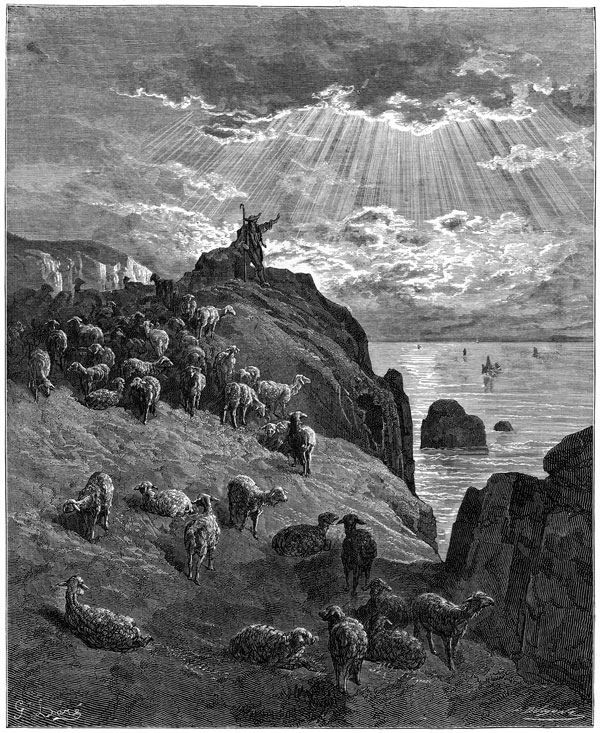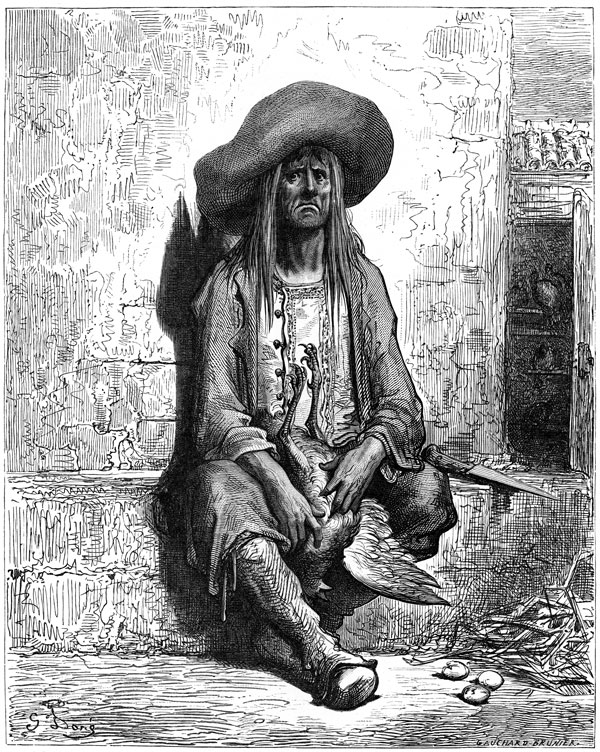Jean de La Fontaine’s verse fables turned traditional folktales into some of the greatest, and best-loved, poetic works in the French language. His versions of stories such as “The Shepherd and the Sea” and “The Hen that Laid the Eggs of Gold” are witty and sophisticated, satirizing human nature in miniature dramas in which the outcome is unpredictable. Here we compare La Fontaine’s versions to the enduring tradition of Aesop’s fables from the Oxford World’s Classics edition of Aesop’s Fables.
THE SHEPHERD AND THE SEA
Jean de La Fontaine
A neighbour of the goddess of the deep
lived free of care on earnings from his sheep,
content with what he had, which to be sure
was modest, though it was at least secure.
He liked to watch the ships return to land,
unloading treasures on the strand.
They tempted him; at last he sold his flock,
and traded all the money on the main;
he lost it when the vessel struck a rock.
The trader went to tend the flocks again,
not as the owner that he used to be,
when sheep of his had grazed beside the sea;
not Corydon or Tircis as before,
just Peterkin and nothing more.
In time he had enough, from what he gained,
to buy some of the creatures clad in fleece.
And then, when winds blew gentle and restrained,
to let the ships unload their goods in peace,
this shepherd could be heard to say:
“You want our money, Madam Sea;
apply to someone else, I pray,
for on my faith, you’re getting none from me.”
This is no idle tale that I invent;
it is the truth that I have told,
which through experience is meant
to show you that a coin you hold
is worth a dozen that you hope to see;
that with their place and rank men must agree;
that thousands would do better to ignore
the counsels of ambition and the sea,
or else they suffer; one perhaps may thrive.
The oceans promise miracles and more,
but if you trust them, storms and thieves arrive.
THE SHEPHERD AND THE SEA
Aesop
There was a shepherd tending his flocks in a place beside the sea. When he saw that the sea was calm and mild, he decided that he wanted to make a voyage. He sold his flocks and bought some dates which he loaded into a ship. He then set sail, but a fierce storm blew up and capsized the ship. The shepherd lost everything and barely managed to get to shore. Later on when the sea had grown calm once again, the shepherd saw a man on the beach praising the sea for her tranquility. The shepherd remarked, “That’s just because she’s after your dates!”
THE HEN THAT LAID THE EGGS OF GOLD
Jean de La Fontaine
Wanting it all will lose it all,
and avarice does that. So let me call,
to give some evidence for what I say,
on him who owned a chicken who would lay
(or so in fable we are told)
a golden egg each day.
Deciding that inside her she must hold
a treasure-house of gold,
he killed her, opened her, and found the same
as in the hens from which no riches came.
He had destroyed the jewel of his store.
Those people always seeking more
can learn a lesson from this dunce.
How many of them recently have passed
from wealthy man to pauper all at once
because they wanted wealth too fast!
THE MAN AND THE GOLDEN EGGS
Aesop
A man had a hen that laid a golden egg for him each and every day. The man was not satisfied with this daily profit, and instead he foolish;y grasped for more. Expecting to find a treasure inside, the man slaughtered the hen. When he found that the hen did not have a treasure inside her after all, he remarked to himself, “While chasing after hopes of a treasure, I lost the profit I held in my hands!”
Jean de La Fontaine (1621-95) followed a career as a poet after early training for the law and the Church. He came under the wing of Louis XIV’s Finance Minister, Nicolas Fouquet, and later enjoyed the patronage of the Duchess of Orléans and Mme de La Sablière. His Fables were widely admired, and he was already regarded in his lifetime as one of the greatest poets of his age. Christopher Betts was Senior Lecturer in the French Department at Warwick University. In 2009 he published an acclaimed translation of Perrault’s The Complete Fairy Tales.
Subscribe to the OUPblog via email or RSS.
Subscribe to only literature articles on the OUPblog via email or RSS.
Image credit: Images from Selected Fables. Used with permission via the public domain.
The post A tale of two fables: Aesop vs. La Fontaine appeared first on OUPblog.




